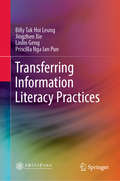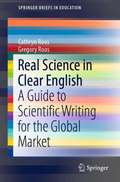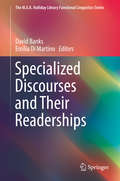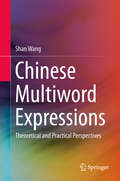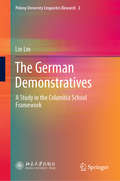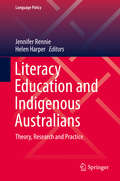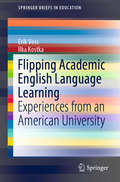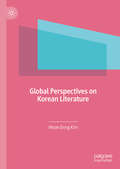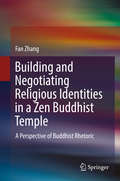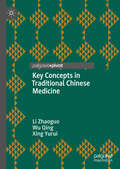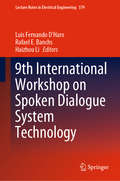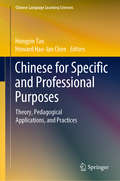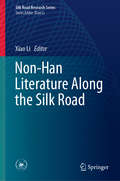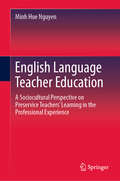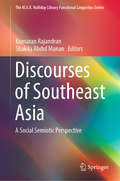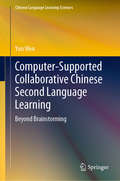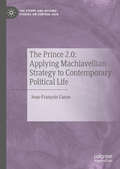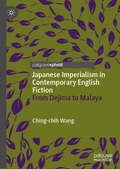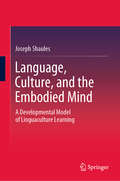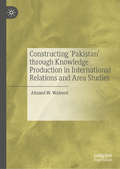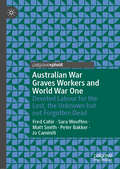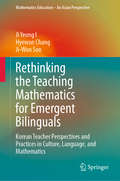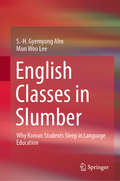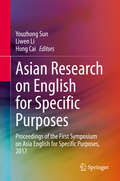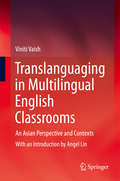- Table View
- List View
Transferring Information Literacy Practices
by Billy Tak Leung Jingzhen Xie Linlin Geng Priscilla Nga PunThis book focuses on information literacy for the younger generation of learners and library readers. It is divided into four sections: 1. Information Literacy for Life; 2. Searching Strategies, Disciplines and Special Topics; 3. Information Literacy Tools for Evaluating and Utilizing Resources; 4. Assessment of Learning Outcomes. Written by librarians with wide experience in research and services, and a strong academic background in disciplines such as the humanities, social sciences, information technology, and library science, this valuable reference resource combines both theory and practice. In today's ever-changing era of information, it offers students of library and information studies insights into information literacy as well as learning tips they can use for life.
Real Science in Clear English: A Guide to Scientific Writing for the Global Market (SpringerBriefs in Education)
by Cathryn Roos Gregory RoosThis book is a timely go-to resource for any professionals wishing to communicate with the growing number of readers whose first language is not English. It highlights the potential language difficulties these readers face, and provides guidelines and tools for overcoming them. The guidelines show how to convey complicated information clearly without affecting the integrity of the subject matter, while the practical ‘before’ and ‘after’ examples clearly illustrate how using these guidelines and improves scientific texts. The book also includes text evaluation tools that allow writers to rapidly assess the readability of their materials. It is based on theory and the authors’ extensive experience in producing highly readable English texts for L2 readers who struggle with materials that were originally prepared for L1 readers.
Specialized Discourses and Their Readerships (The M.A.K. Halliday Library Functional Linguistics Series)
by David Banks Emilia Di MartinoThis volume studies the relationship between the writers of specialized text and their readers in a broad range of settings, including research, popularization and education. It offers younger researchers an insight into the targeting process, helping them consider the impact their work can have, and showing them how to achieve greater exposure. Further, it offers an invaluable reflective instrument for beginning and experienced researchers, drawing on a veritable treasure trove of their colleagues’ experience. As such, it represents a way for researchers and students in linguistics and related disciplines to access issues from a different, insider perspective.Reader targeting has become a very sophisticated process, with authors often addressing their potential readers even in video. Compared to other forms of writing, academic writing stands out because authors are, in the majority of cases, also consumers of the same type of products, which makes them excellent “targeters.”
Chinese Multiword Expressions: Theoretical and Practical Perspectives
by Shan WangThis book is the first English monograph to systematically explore Chinese Multiword expressions (MWEs) by applying corpus-driven and corpus-based approaches. It reveals the unique characteristics of Chinese MWEs by examining their core attributes, identification and classification, and knowledge framework. It also assesses, for the first time, the distribution and density of Chinese MWEs in textbooks. By doing so, the book provides important insights into Chinese language learning, with implications for natural language processing, lexicography, and psychology. Moreover, it offers a framework for linguists, language teachers and learners, computer scientists, lexicographers, and psychologists to explore their own areas of interest.
The German Demonstratives: A Study in the Columbia School Framework (Peking University Linguistics Research #2)
by Lin LinThis book explores, analyzes, and compares the use of German and Chinese demonstratives. Discourse and textual uses of the forms are considered, as well as their locative and temporal uses. The author observes that in both languages the demonstratives can be used to refer to referents. However, she departs from the common assumption that proximal demonstratives refer to entities or places close to the speaker, while non-proximal demonstratives refer to entities or places far from the speaker. Having analyzed a representative sampling consisting of a German text and a Chinese text, the author argues that both German and Chinese proximal demonstratives can signal the meaning of HIGH DEIXIS in a system of DEIXIS in the Columbia School of linguistics framework, whereas their non-proximal demonstratives can signal the meaning of LOW DEIXIS. In addition, Chinese demonstratives can be used under more circumstances than German demonstratives due to the lack of articles in Chinese. The author also argues that Cognitive Linguistic analysis is more helpful for new language learners, whereas the Columbia School of linguistics may be better suited to advanced learners who wish to know more about the intrinsic differences between words with similar meanings and uses.This book aims to help German learners better understand the German reference system. Readers with a Chinese language background will definitely benefit more from the book, as well as Chinese learners with a German language background. For pure linguistic enthusiasts and multi-linguals, the book offers an extensive introduction to the Columbia School of linguistics, and can open a new horizon for learning a new language comparatively.
Literacy Education and Indigenous Australians: Theory, Research and Practice (Language Policy #19)
by Jennifer Rennie Helen HarperThis edited volume brings together diverse perspectives on Australian literacy education for Indigenous peoples, highlighting numerous educational approaches, ideologies and aspirations. The Australian Indigenous context presents unique challenges for educators working across the continent in settings ranging from urban to remote, and with various social and language groups. Accordingly, one of the book’s main goals is to foster dialogue between researchers and practitioners working in these contexts, and who have vastly different theoretical and ideological perspectives. It offers a valuable resource for academics and teachers of Indigenous students who are interested in literacy-focused research, and complements scholarship on literacy education in comparable Indigenous settings internationally.
Flipping Academic English Language Learning: Experiences from an American University (SpringerBriefs in Education)
by Erik Voss Ilka KostkaThis book draws on theory, research, and practice-oriented literature to offer an introduction to flipped learning and offer busy instructors advice on how to flip their academic English language courses. The chapters balance theoretical foundations, practical applications, and useful resources for developing materials. The first half of this book defines flipped learning and academic English, describes how it supports English language learning, and explains the role of technology, as well as issues with accountability and feedback. The second half of the book then makes connections between the theoretical issues presented in the first three chapters and the practical applications in the following chapters, which provide lesson descriptions and assessment ideas for language learning contexts with or without access to technology. The book concludes with a list of tools and technologies for developing materials and activities, as well as additional resources for professional development and further exploration of flipped English language learning.
Global Perspectives on Korean Literature
by Wook-Dong KimThis book explores Korean literature from a broadly global perspective from the mid-9th century to the present, with special emphasis on how it has been influenced by, as well as it has influenced, literatures of other nations. Beginning with the Korean version of the King Midas and his ass’s ears tale in the Silla dynasty, it moves on to discuss Ewa, what might be called the first missionary novel about Korea written by a Western missionary W. Arthur Noble. The book also considers the extent to which in writing fiction and essays Jack London gained grist for his writing from his experience in Korea as a Russo-Japanese War correspondent. In addition, the book explores how modern Korean poetry, fiction, and drama, despite differences in time and space, have actively engaged with Western counterparts. Based on World Literature, which has gained slow but prominent popularity all over the world, this book argues that Korean literature deserves to be part of the Commonwealth of Letters.
Building and Negotiating Religious Identities in a Zen Buddhist Temple: A Perspective of Buddhist Rhetoric
by Fan ZhangThis book explores the practices in a Zen Buddhist temple located in Northwest Ohio against the backdrop of globalization. Drawing on the previous studies on Buddhist modernization and westernization, it provides a better understanding of the westernization of Buddhism and its adapted practices and rituals in the host culture. Using rhetorical criticism methodology, the author approaches this temple as an embodiment of Buddhist rhetoric with both discursive and non-discursive expressions within the discourses of modernity. By analyzing the rhetorical practices at the temple through abbots’ teaching videos, the temple website, members’ dharma names, and the materiality of the temple space and artifacts, the author discovers how Buddhist rhetoric functions to constitute and negotiate the religious identities of the community members through its various rituals and activities. At the same time, the author examines how the temple’s space and settings facilitate the collective the formation and preservation of the Buddhist identity. Through a nuanced discussion of Buddhist rhetoric, this book illuminates a new rhetorical methodology to understand religious identity construction. Furthermore, it offers deeper insights into the future development of modern Buddhism, which are also applicable to Buddhist practitioners and other major world religions.
Key Concepts in Traditional Chinese Medicine
by Li Zhaoguo Wu Qing Xing YuruiThis book offers a comprehensive overview of Chinese medicine terminology translation, defining the most central concepts in Chinese traditional medicine, providing simplified Chinese characters, Mandarin Pronunciation in pinyin, citations for 111 of the most key concepts in traditional Chinese medicine and culture. Covering definitions of terms relating to essence, qi, yin-yang theory, five elements and visceral manifestation in traditional medicine, it offers a selection of English versions of each term in addition to a standard English version, drawing on the translation history of traditional Chinese medicine. It provides a useful resource to understand the fundamental terms of traditional Chinese medicine and culture in Chinese and English, and their relevance to cross-cultural discourse.
9th International Workshop on Spoken Dialogue System Technology (Lecture Notes in Electrical Engineering #579)
by Luis Fernando D’Haro Rafael E. Banchs Haizhou LiThis book presents the outcomes of the 9th International Workshop on Spoken Dialogue Systems (IWSDS), “Towards creating more human-like conversational agent technologies”. It compiles and provides a synopsis of current global research to push forward the state of the art in dialogue technologies, including advances in the context of the classical problems of language understanding, dialogue management and language generation, as well as cognitive topics related to the human nature of conversational phenomena, such as humor, empathy and social context understanding and awareness.
Chinese for Specific and Professional Purposes: Theory, Pedagogical Applications, and Practices (Chinese Language Learning Sciences)
by Hongyin Tao Howard Hao-Jan ChenThis book, likely the first of its kind in the English language, explores Chinese for specific and professional purposes (CSP) in terms of theorizing and developing practical applications for language teaching and learning. While research in language for specific purposes is thriving for languages such as English, there has been comparatively little such research conducted for Chinese. This volume attempts to fill the gap by bringing together practitioners from a broad international scholarly community, who share common interests yet diverse orientations. Seventeen papers are included, and address four broad thematic categories: (1) academic Chinese, (2) business Chinese, (3) Chinese for medicine and health care, and (4) Chinese for other broadly defined services and industries (diplomacy, tourism, wine-tasting, etc.). Representing the state of the art in CSP research, the book offers an indispensable guide for anyone interested in theoretical and practical issues in this area of applied Chinese language studies.
Non-Han Literature Along the Silk Road (Silk Road Research Series)
by Xiao LiThis volume includes outstanding scientific articles on documents written in ancient languages such as Tocharian, Sogdian, Khotanese, and Old Uyghur. Its chief aims are to contribute to the present state of research by adding essential findings on newly discovered historical documents; to present a multi-dimensional investigation of diverse aspects including the history, religion, art, literature, and social life along the Silk Road; and to outline potential future research directions for non-Han literature studies and inspire research into other aspects, such as economics and comparative studies.
English Language Teacher Education: A Sociocultural Perspective on Preservice Teachers’ Learning in the Professional Experience
by Minh Hue NguyenThis book examines a range of complex issues concerning the professional experience (i.e., practicum) in English language teacher education with regard to curriculum design and implementation, as well as professional learning. Drawing on a sociocultural perspective, it explores the context of the professional experience, preservice teachers as learners of English language teaching, and the activity of learning to teach English language in connection with interrelated contextual and personal issues: contextual issues such as policies, curricula, university-school partnerships, and mentoring relations are investigated in relation to personal issues such as the beliefs, expectations, prior educational experiences, previous teaching experiences, and cultural-linguistic backgrounds of preservice teachers. In turn, the book addresses professional learning issues, including professional identity development, emotional experiences, and pedagogical learning, in depth. The book delves into the qualitative “fine-grained” aspects of the professional experience while also making valuable conceptual contributions through a sociocultural analysis of the professional learning experience, which can also be applied to research in other teacher education contexts. The findings presented here hold practical implications for English language teacher education in terms of developing a knowledge base for English language teaching and an effective model of professional experience to prepare English language teachers for working in today’s expanded, diverse and dynamic neoliberal contexts.
Discourses of Southeast Asia: A Social Semiotic Perspective (The M.A.K. Halliday Library Functional Linguistics Series)
by Kumaran Rajandran Shakila Abdul MananDiscourses of Southeast Asia presents the latest Southeast Asian research in Systemic Functional Linguistics (SFL). SFL provides a sophisticated social semiotic architecture for exploring meaning in languages and texts in the context of Southeast Asia. This edited volume examines the ideational, interpersonal and textual metafunctions in the domains of education, media, translation and language typology. It applies SFL in text analysis so as to be relevant to theory, research and professional practice. This book brings together 12 original chapters by both seasoned and emerging scholars. Their chapters study the ‘native’ languages of Southeast Asia: Indonesian, Malay, Tagalog, Thai and Vietnamese, and relatively newer languages in Southeast Asia: English and Mandarin. The chapters analyze a variety of texts, namely advertisements, classroom interactions, corporate reports, dramas, interviews, media reports, narratives, novels, textbooks and video clips. This volume captures the exciting and productive state of the art of SFL in Southeast Asia. It will be of particular interest to scholars trying to understand the application of SFL in this region.
Computer-Supported Collaborative Chinese Second Language Learning: Beyond Brainstorming (Chinese Language Learning Sciences)
by Yun WenThis book explores the implementation of an online representational tool, GroupScribbles, in Chinese-as-a-second-language classrooms from primary school to secondary school. It demonstrates the effectiveness of combining online representational tools with face-to-face classroom learning, and provides a workable approach to analysing interactions interweaving social and cognitive dimensions, which take place in the networked classroom. A series of suggestions regarding networked second language learning will help educators effectively implement information and communication technology tools in the classroom.
The Prince 2.0: Applying Machiavellian Strategy to Contemporary Political Life (The Steppe and Beyond: Studies on Central Asia)
by Jean-François CaronThis Pivot updates the ideas of the famous political philosopher from the Italian Renaissance, Machiavelli, for the 21st century, using case studies from the West and from Kazakhstan to demonstrate the utility of Machiavelli's ideas for contemporary political life. In truth, Machiavelli's ideas have never lost their value. Although "Machiavellian" as an adjective tends to describe amoral cynicism in contemporary usage, Machiavelli's ideas were deeply ethical and oriented towards achieving long-term goals. Contemporary readers may be put off by medieval language and examples, misled into believing Machiavelli speaks to a different age; and yet the author here explores how Machiavellian strategy can be of value— ethical as well as practical—in the 21st century.
Japanese Imperialism in Contemporary English Fiction: From Dejima to Malaya
by Ching-chih WangThis book considers literary images of Japan created by David Mitchell, Kazuo Ishiguro, and Tan Twan Eng to examine the influence of Japanese imperialism and its legacy at a time when culture was appropriated as route to governmentality and violence justified as root to peace. Using David Mitchell’s The Thousand Autumns of Jacob de Zoet, Tan Twang Eng’s The Garden of the Evening Mists and Kazuo Ishiguro’s work to examine Japanese militarists’ tactics of usurpation and how Japanese imperialism reached out to the grass-root public and turned into a fundamental belief in colonial invasion and imperial expansion, the book provides an in depth study of trauma, memory and war. From studying the rise of Japanese imperialism to Japan’s legitimization of colonial invasion, in addition to the devastating consequences of imperialism on both the colonizers and the colonized, the book provides a literary, discursive context to re-examine the forces of civilization which will appeal to all those interested in diasporic literature and postcolonial discourse, and the continued relevance of literature in understanding memory, legacy and war.
Language, Culture, and the Embodied Mind: A Developmental Model of Linguaculture Learning
by Joseph ShaulesThere is an odd contradiction at the heart of language and culture learning: Language and culture are, so to speak, two sides of a single coin—language reflects the thinking, values and worldview of its speakers. Despite this, there is a persistent split between language and culture in the classroom. Foreign language pedagogy is often conceptualized in terms of gaining knowledge and practicing skills, while cultural learning goals are often conceptualized in abstract terms, such as awareness or criticality.This book helps resolve this dilemma. Informed by brain and mind sciences, its core message is that language and culture learning can both be seen as a single, interrelated process—the embodiment of dynamic systems of meaning into the intuitive mind. This deep learning process is detailed in the form of the Developmental Model of Linguaculture Learning (DMLL). Grounded in dynamic skill theory, the DMLL describes four developmental levels of language and culture learning, which represents a subtle, yet important shift in language and culture pedagogy. Rather than asking how to add culture into language education, we should be seeking ways to make language and culture learning deeper—more integrated, embodied, experiential and transformational. This book provides a theoretical approach, including practical examples, for doing so.
Constructing 'Pakistan' through Knowledge Production in International Relations and Area Studies
by Ahmed W. WaheedThis book analyses the discourse on Pakistan by exploring the knowledge production processes through which the International Relations community, Asian and South Asian area study centres, and think-tanks construct Pakistan’s identity. This book does not attempt to trace how Pakistan has been historically defined, explained, or understood by the International Relations interpretive communities or to supplant these understandings with the author’s version of what Pakistan is. Instead, this study focuses on investigating how the identity of Pakistan is fixed or stabilized via practices of the interpretive communities. In other words, this book attempts to address the following questions: How is the knowledge on Pakistan produced discursively? How is this knowledge represented in the writings on Pakistan? What are the conditions under which it is possible to make authoritative claims about Pakistan?
Australian War Graves Workers and World War One: Devoted Labour for the Lost, the Unknown but not Forgotten Dead
by Fred Cahir Sara Weuffen Matt Smith Peter Bakker Jo CaminitiThis book relays the largely untold story of the approximately 1,100 Australian war graves workers whose job it was to locate, identify exhume and rebury the thousands of Australian soldiers who died in Europe during the First World War. It tells the story of the men of the Australian Graves Detachment and the Australian Graves Service who worked in the period 1919 to 1922 to ensure that grieving families in Australia had a physical grave which they could mourn the loss of their loved ones. By presenting biographical vignettes of eight men who undertook this work, the book examines the mechanics of the commemoration of the Great War and extends our understanding of the individual toll this onerous task took on the workers themselves.
Rethinking the Teaching Mathematics for Emergent Bilinguals: Korean Teacher Perspectives and Practices in Culture, Language, and Mathematics (Mathematics Education – An Asian Perspective)
by Ji Yeong I Hyewon Chang Ji-Won SonThis book focuses on the role of cultural background in Korean public schools, and provides essential insights into how Korean teachers perceive and respond to the transition of their classroom situations with Korean language learners. It reveals the perspectives and the practices of Korean teachers, especially with regard to multicultural students who struggle with language barriers when learning mathematics. The information provided is both relevant and topical, as teaching mathematics to linguistically and culturally diverse learners is increasingly becoming a worldwide challenge.
English Classes in Slumber: Why Korean Students Sleep in Language Education
by Mun Woo Lee S.-H. Gyemyong AhnThis book explains why some Korean high school students sleep during English classes in spite of the emphasized value of English in their society. It examines how this sleeping-in-class phenomenon can be understood by means of such marginalized students’ emic outlooks on themselves, the target language, their teachers, schools, and society/culture; and by means of the views of teachers who have experienced such in-class sleepers. To understand the phenomenon more holistically, it pursues a multi-disciplinary approach drawing on studies of demotivation and amotivation, psychological needs, and student experiences of schooling, as well as sociocultural theories of learning and agency and of interpersonal dynamics, among others. On the basis of a multi-modal analysis of interview data from the student and teacher participants, it theoretically interprets the phenomenon at the classroom (‘micro-’), school (‘meso-’) and society-culture (‘macro-’) levels. Taking a humanistic/existential approach to education, it subsequently presents a number of cultural actions that it advocates implementing in a situation-sensitive manner to help in-class sleepers and their educational institutions awaken from their chronic slumber. Lastly, it presents practical and theoretical implications for more humanistic pedagogy, and global studies of student disengagement, in English-as-a-foreign-language classes.
Asian Research on English for Specific Purposes: Proceedings of the First Symposium on Asia English for Specific Purposes, 2017
by Youzhong Sun Liwen Li Hong CaiEnglish for Specific Purposes (ESP), addressing the communicative needs and practices of particular professional or occupational groups, has developed rapidly in the past fifty years and is now a major force in English language teaching and research. This critical volume helps innovate the theory, practice, and methodology for ESP teaching and research in Asian countries and areas. Promoting communication and enhancing cooperation on ESP research and pedagogy across cultures, it provides ESP scholars, educators and practitioners with an opportunity to benefit from each other’s research and expertise in an age of globalization and digitalization. The volume provides an in-depth analysis of the latest scholarship on English teaching and research for general and specific academic and occupational purposes; the intercultural communication in ESP contexts; corpus linguistics and data-driven instruction for ESP; computer-assisted language learning and mobile-assisted language learning; evaluation of English writing courses; and ESP translation strategies.
Translanguaging in Multilingual English Classrooms: An Asian Perspective and Contexts
by Viniti VaishThis book is the first to apply the theory of translanguaging to multilingual classrooms in an Asian context, offering strategies for teaching specific grammatical and comprehension skills to students struggling to read in English. It also enriches the methodology of coding bilingual transcripts with ideas resulting from a detailed analysis of a large and rich data set. Lastly, the author discusses growth areas in the emerging field of translanguaging and challenges for teachers implementing a translanguaging approach in a superdiverse classroom.
